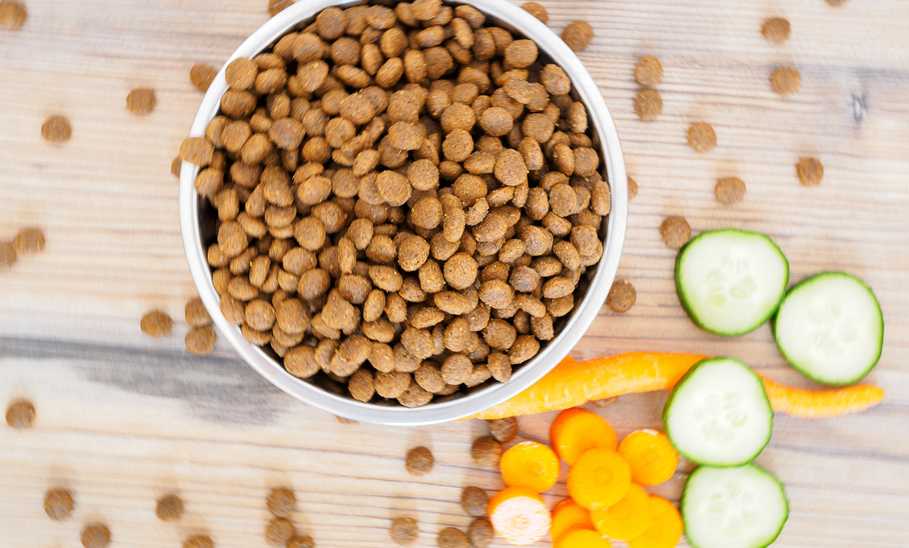It’s disheartening to see your incredible dog develop itchy, red skin and bare spots from nonstop chewing because of an undiagnosed food allergy. But the good news is there are many quality diets available to help dogs avoid food allergens. While I’ve found eight excellent dog food recipes and spoken with a veterinarian about allergies, I’ve also included a comprehensive guide to help you find the best allergy-friendly food for your dog’s unique dietary needs.
If you are convinced that their kibble is causing severe rashes, extreme itchiness, and/or unfortunate digestive problems, it’s time to talk with your veterinarian about resetting your dog’s diet with a food that is free of problematic allergens for healthier skin, a shinier coat and a much happier life.
Our top picks for the best dog foods for allergies
![[object Object] [object Object]](https://image.chewy.com/is/image/catalog/160754_MAIN._AC_SS300_V1590007562_.jpg)
Instinct Raw Boost Grain-Free Recipe with Real Salmon
This vitamin and mineral-rich fishy formula is an especially healthy recipe for dogs dealing with severe skin allergies. Its freeze-dried pieces of raw salmon and white fish meat are especially popular with picky eaters. I feed my own Yorkie the beef formula, and she immediately picks out those freeze-dried meaty pieces, which is great because the freeze-drying process seals in the fresh, raw nutrition found in every chunk.
This grain-free meal is available in three recipes, and while they all feature omega-3 and omega-6 fatty acids for skin and coat health, the salmon flavor is especially packed with skin-supporting supplements to help allergic dogs recover that much sooner. Good to know: Instinct Raw Boost made our lists for the best dog foods, best dog food brands, and best dog foods for puppies.
Specifications
- First 5 ingredients: Salmon, white fish meal, peas, menhaden fish meal, canola oil
- Type: Dry kibble with freeze-dried raw pieces
- Life stage: All Life Stages
- Best for: Skin and coat health, digestive health, weight management
- Flavors: Real Salmon, Real Beef, Real Chicken
Pros:
- Premium, high-protein ingredients
- Fish-based diet makes it easier to avoid common food allergens
- Dogs love the freeze-dried raw kibble pieces
Cons:
- This is a fairly pricey formula
The bottom line:
This fish-based kibble with freeze-dried raw pieces is packed with flavor and nutrition to support your allergic pup’s skin and overall health.
![[object Object] [object Object]](https://image.chewy.com/is/image/catalog/259535_MAIN._AC_SS300_V1704812322_.jpg)
ACANA Singles Limited Ingredient Diet Pork & Squash Recipe
If you believe that chicken is aggravating your dog’s allergies, all four ACANA Singles recipes are excellent chicken-free formulas and some of the all-around best dry dog foods available. Since each recipe utilizes a single animal protein source, it’s easy to perform an elimination test to confirm if your dog is allergic to chicken while giving options like pork, beef or duck a try. Dogs love this meaty recipe, and because each flavor is easy to digest, made without common fillers like corn and wheat, and is a high-protein diet, I’m happy to feed ACANA Singles to them.
Specifications
- First 5 ingredients: Pork, pork meal, pork liver, sweet potato, whole chickpeas
- Type: Dry kibble
- Life stage: All Life Stages
- Best for: Skin and coat health, digestive health, high animal protein diets
- Flavors: Pork & Squash, Lamb & Apple, Duck & Pear, Beef & Pumpkin
Pros:
- All four recipes are 100% chicken-free
- High-quality animal proteins
- Easy to digest
Cons:
- Unpleasant smell, but your dog will approve
The bottom line:
This easy to digest pork and squash recipe is nutritious, high quality and great for pups that need to stay away from chicken.
![[object Object] [object Object]](https://a.media-amazon.com/images/I/81g2PFZZ8HL.__AC_SX300_SY300_QL70_FMwebp_.jpg)
Merrick Limited Ingredient Diet Grain-Free Real Lamb Recipe
Sometimes, it’s hard to find a diet that doesn’t trigger an allergic reaction in your dog. But with Merrick’s nourishing lineup of canned foods with three unique recipes to choose from, chances are good that one will become your dog’s new favorite wet food. Although chicken and turkey alternates are available, we recommend serving up the lamb recipe, which is protein-rich and free of poultry, potato, corn, soy and peas.
Specifications
- First five ingredients: Deboned lamb, water, lamb liver, natural flavor, salt
- Type: Wet food
- Life stage: Adult
- Best for: Limited-ingredient diets, high-protein diets, single-protein diets
- Flavors: Real Lamb Recipe, Chicken & Brown Rice Recipe, Turkey & Brown Rice Recipe
Pros:
- Limited ingredient list makes it easier to avoid common allergens
- Grain-free recipe
- Easy to digest
Cons:
- Flavors like beef, pork and duck aren’t offered
The bottom line:
This protein-rich, limited ingredient diet will help your lamb-loving pup avoid grains.
![[object Object] [object Object]](https://image.chewy.com/is/image/catalog/109395_MAIN._AC_SS300_V1716555029_.jpg)
Nutro Limited Ingredient Diet Grain Free Lamb & Sweet Potato
With less than 10 key ingredients, Nutro Limited is hands-down the easiest and healthiest way to keep common allergens like corn, wheat, soy, dairy and grains out of your sensitive pup’s diet. Made with a handful of premium ingredients, including New Zealand sourced lamb and easy-to-digest potatoes, this is a protein-, vitamin- and mineral-rich diet that is well-suited for dogs who need to avoid grain altogether.
Specifications
- First five ingredients: Deboned lamb, lamb meal, chickpeas, dried potatoes, dried sweet potatoes
- Type: Dry kibble
- Life stage: Adult
- Best for: Skin and coat health, easy to digest, single animal protein diets
- Flavors: Lamb & Sweet Potato, Venison Meal & Sweet Potato
Pros:
- 100% grain-free formula
- 100% chicken-free
- Premium ingredients
Cons:
- Only 2 recipes and both contain sweet potato
- Not a true limited ingredient diet, which is a single protein source and a single carbohydrate source
The bottom line:
Nutro makes it easy for your allergic dog to get quality ingredients, like New Zealand sourced lamb, while avoiding all grains.
![[object Object] [object Object]](https://image.chewy.com/is/image/catalog/113395_MAIN._AC_SS300_V1725892599_.jpg)
Ziwi Peak Original Series Beef Recipe
Wet dog food is an excellent way to keep your pet hydrated throughout the day, while providing a meatier and substantially more protein-rich diet than the average kibble brand. With a whopping 91% meat content and a number of premier-grade ingredients such as New Zealand beef and green mussels, I am extremely impressed with Ziwi’s premium-grade superfood-infused wet canned food.
Specifications
- First five ingredients: Beef, water, beef lung, beef kidney, beef tripe
- Type: Wet food
- Life stage: All Life Stages
- Best for: Extremely-high protein diets, grain-free
- Flavors: Beef Recipe, Lamb Recipe, Chicken Recipe
Pros:
- 91% of its formula is animal protein
- Grain and filler-free formula
- Premium-grade ingredients
Cons:
- Its meaty recipe is particularly smelly, but dogs adore the odor
- Labeled as a single protein food but contains both beef and mussels
The bottom line:
With New Zealand beef and mussels, this meaty wet food will help keep your pet healthy, hydrated and satisfied.
![[object Object] [object Object]](https://image.chewy.com/is/image/catalog/333579_MAIN._AC_SS300_V1712067301_.jpg)
Addiction Zen Vegetarian Sensitive Care
Unfortunately, some dogs have an awful allergic reaction to all kinds of animal proteins. If your dog falls into this category, you should give Zen Vegetarian’s animal-free kibble a try. Rich in soy protein and formulated for comprehensive skin, coat, digestive, and heart health, this palatable oat-based dry food is easily one of the best vegetarian dog foods on the market. Since dogs are omnivores, a vegetarian diet should only be introduced under the ongoing supervision of a veterinarian.
Specifications
- First five ingredients: Oats, soybean meal, rice, peas, coconut oil
- Type: Dry kibble
- Life stage: All Life Stages
- Best for: Skin and coat health, digestive health, zero animal protein diets
- Flavor: Vegetarian formula
Pros:
- Premium ingredients
- Perfect solution for dogs with multiple animal protein allergies
- Easy to digest
Cons:
- Not suitable for dogs allergic to soybeans
The bottom line:
If your dog is one of the rare ones that can’t tolerate animal proteins in their diet, this plant-based recipe might be the solution.
![[object Object] [object Object]](https://image.chewy.com/is/image/catalog/152869_MAIN._AC_SS300_V1721421112_.jpg)
Blue Buffalo Natural Veterinary Diet NP Novel Protein Alligator
If you discover your best friend is allergic to every kind of red meat and poultry-based dog food you’ve bought for them, don’t give up hope. There are a number of unusual protein-based options available that are well worth a try, such as Blue Buffalo’s alligator recipe. Lower in fat, high in protein, and a flavor that genuinely tastes like chicken, alligator is a healthy alternative meat that fewer dogs are allergic to. And Blue Buffalo’s grain-free recipe was specially formulated by veterinarians to conquer skin and digestive problems caused by food-based allergies.
Specifications
- First five ingredients: Deboned alligator, peas, pea starch, alligator meal, pea protein
- Type: Dry kibble
- Life stage: All Life Stages
- Best for: Extreme animal protein allergies, skin and coat health, grain-free diets
- Flavor: Alligator
Pros:
- Premium protein that dogs are rarely allergic to
- Top-quality ingredients
- Dogs love the taste
Cons:
- Must be prescribed by a veterinarian
The bottom line:
With its chicken-like taste, this alligator recipe is great for allergic dogs trying to stay away from poultry and red meat.
How we chose the best dog food for allergies
We thoroughly researched numerous big-name and lesser-known dog food brands and their respective recipes, had our own adorable, yet allergy prone dogs taste-test many formulas, and kept our previous experience with quality dog foods in mind to select the top foods for dogs dealing with allergies. Some of the most important considerations we noted include premium ingredient quality, a palatable and healthy recipe, multiple flavor options and size options, and price.
How to choose the best dog food for allergies
The dietary elimination trial or food trial
If you suspect your dog is allergic to their food, talk with your veterinarian. Signs of environmental allergies and food allergies can be similar and it’s possible that your dog could have one or both issues. Sometimes these issues can also be complicated with skin infections, which make itching even worse, and require additional medical attention.
Common food allergens for dogs include chicken, beef, wheat, soy and dairy. Dr. Kevin Puzycki, a veterinarian at Low Cost Medical Center in New Orleans and spokesperson for Solid Gold said, “The official way to diagnose a dog with a food allergy is to conduct a food trial using a prescription hypoallergenic diet for a duration of 8 to 12 weeks. During this period, it's crucial to eliminate all other sources of food, including treats and human foods. If your dog is officially diagnosed with a food allergy, there are food options available that can help manage their condition effectively.
He goes on to say, “For dogs suspected of having food allergies, it's advisable to avoid common ingredients like wheat gluten and soy. Additionally, it's a good practice to read ingredient lists on packaging. The first ingredient listed is the primary component of the food, so it should ideally be a high-quality protein source.”
If your dog does better on a new food, it was likely that an ingredient in their previous meals caused an allergic reaction. Continue providing them the replacement food, and be sure to keep any known allergens out of their diet going forward for clear skin, a regular digestive system and a happy dog. You may also need to switch out what flavored toothpaste and flavored medications your pup is on, so talk with your vet about non-allergenic options.
Limited ingredient diet
One of the best types of dog food to introduce to your dog in a diet trial is a limited ingredient formula. Recipes such as ACANA Singles Limited Ingredient Diet Pork & Squash Recipe are primarily composed of a main protein and a small handful of additional ingredients, which makes it easy to test out a new protein source while completely avoiding known allergens.
Introduce a vegetarian diet
Although it is relatively rare for dogs to have a negative reaction to multiple animal proteins, some allergy-prone pups may need an alternate veggie-based dog food for a healthy lifestyle. The most common veggie-based dog foods use pumpkins and sweet potatoes as the main ingredient, but other niche recipes are available.
A vegetarian diet should only be used under the advice of a veterinarian, particularly for puppies. It’s difficult to meet the nutritional needs of growing dogs with a food that contains no animal ingredients. Make sure the diet states that it meets the nutritional guidelines of the Association for the American Feed Control Officials (AAFCO) for your dog’s life stage. If your dog is a large breed puppy, make sure the food specifically states it’s suitable for puppies that will grow to be 70 pounds or more as an adult.
Novel proteins
If your poor puppy is allergic to commonplace animal proteins like poultry, beef, lamb, and pork, then you’ll want to try a novel protein, which is a protein your pup has never had. There are many options that may be safe for your dog’s diet. Salmon, mackerel and catfish all promote skin and coat health because they contain omega-3 fatty acids. Unconventional animal protein sources like rabbit, pheasant, alligator, kangaroo, goat, bison and venison are all healthy options that are rarely allergens for dogs.
Although novel protein sources may be the perfect solution for your formerly-itchy dog, be prepared to pay much more for these alternate dog food recipes.
Hydrolyzed diet
It’s also possible that your veterinarian may put your pup on a hydrolyzed diet. A hydrolyzed diet means the protein—even a common one, like chicken—has been broken down in a way that the body no longer recognizes it as a problem.
Dog food allergy symptoms
Skin issues
An array of painful and unpleasant skin-related problems are the most common reactions to food allergens. Dogs suffering from food allergies often struggle with red and inflamed skin, severe itchiness, fur loss, flaky and dry skin, bumpy rashes and other skin conditions.
Digestive issues
You will find out quickly if a dog’s food allergens impact their digestion, as symptoms include loose and runny stools, vomiting and lingering gassiness. It’s also possible for a dog to have an intolerance to a certain food that isn’t an allergy. It just doesn’t sit well with their belly.
Behavioral issues
In addition to the more obvious symptoms, a dog impacted by severe food allergies may exhibit behavioral changes such as lethargy or anxiety because they simply don’t feel well.
What are common dog food allergens?
“When it comes to allergens in food for dogs, we often see reactions to protein sources like chicken, beef, lamb and others. Additionally, dogs can also be allergic to non-protein additives found in food, such as dairy, wheat gluten and soy,” explained Dr. Puzycki.
Despite the multiple proteins that may cause an allergic reaction for dogs, food allergy is actually a less common cause of skin issues than environmental allergens, like fleas or pollen. However, if your dog does truly have a food allergy and exhibits itchiness, red skin, and excessive chewing, it may be because one of the following ingredients are in your dog’s food:
- Chicken: A particularly popular dog food protein that is often included as in the form of poultry meal and chicken organs, like liver. If your dog is allergic to chicken, pay close attention to the ingredient lists of different recipes to ensure that chicken doesn’t sneak back into your dog’s diet. Don’t forget to check treats, flavored toothpaste and flavored medications.
- Eggs: Thankfully for dogs who are allergic to eggs, few dog foods utilize chicken eggs as their main protein source, however eggs are sometimes included.
- Beef and lamb: Like chicken, beef is commonly used as a main protein source in numerous dog food recipes, but beef is another popular ingredient that some dogs cannot handle. Lamb is known to be an allergen for some dogs too but it’s not as common as beef.
- Soy: Often used as both a protein source and an all-around filler, soy is another food allergen for dogs. If you are avoiding soy-based dog foods, carefully read recipe lists for ingredients like soy flour, soy oil and soybean meal to keep soy out of your allergic dog’s diet. Oils and other fats, however, are less likely to cause an allergic reaction.
- Wheat and corn: Although dogs rarely have an issue with rice, other grains such as wheat and corn aren’t just harder to process, but they are also an allergen for some dogs.
- Dairy: Although dogs tend to love cheese and milk-based ingredients, many dogs have a tough time digesting dairy products. But this doesn’t necessarily mean it’s a food allergen for them. Their belly just may not be able to digest it. If your puppy shows tummy trouble or inflamed red skin, and regularly eats a cheesy or milk-infused dog food, this is the first ingredient to cut from their diet.
How to help a dog with food allergies
Although following through with the dietary elimination trial above is vital for helping a dog dealing with food allergies, your veterinarian can provide additional ways to help your poor pup in their time of need.
Immediate veterinary care
If your dog has extreme anxiety and itchiness due to a severe food allergy, they need medical attention. Dr. Puzycki states, “The most common sign of a food allergy in dogs is pruritus, also known as itchiness. Generalized itching can be a significant symptom of a food allergy in dogs, and pet parents often observe excessive licking of the paws, face and ears as a prominent indication. This widespread itchiness may also manifest as scratching, biting or rubbing against surfaces.”
Though things like removing the remaining problematic food and giving your dog a cool bath to soothe their reddened, itchy skin can help, additional measures such as prescription topical, oral and/or injectable medication for possible secondary skin infections and/or ear infections may also be needed. Infections can significantly up the itch factor in an already itchy dog.
If environmental allergens are suspected, your vet may also suggest allergy skin testing to learn exactly what environmental allergens are bothering your dog.
When it comes to food, if an over-the-counter diet won’t work for your pup, the vet may prescribe a specialty food for allergy-prone dogs, like Blue Buffalo Natural Veterinary Diet NP Novel Protein Alligator. If your dog’s condition improves, congratulations! You have likely identified the ingredient that your dog is allergic to, while finding a safe alternate food in the process.
Frequently asked questions (FAQs)
How can I tell if my dog is allergic to his food?
Some of the most common symptoms associated with food allergies include rashes, painful red spots, severe itchiness, dry skin, fur loss and other skin issues. Some dogs may have digestive problems such as vomiting, watery stool and excessive gas. Keep in mind that other medical issues can cause these problems as well.
If your dog constantly experiences these symptoms, you should first consult your veterinarian. If they suspect food allergy is involved, they may have your dog try an alternate recipe that uses a different protein source as its main ingredient. A protein source is the most common cause of dog food allergies. If your vet suspects that your dog is allergic to chicken, they’ll have you swap the food for a protein that your dog hasn’t had before, and one that is less likely to be a problem, like fish, or something more unique, such as kangaroo.
How do you know if your dog is allergic to chicken?
The best way to find this out is by talking with your veterinarian. The skin issues of a chicken allergy and environmental allergies can be similar. Experimenting with your dog’s diet by switching out their current food for a chicken-free alternative for 8 to 12 weeks is the best way to determine if your dog is allergic to chicken. Digestive upset can sometimes be due to chicken allergy as well. Though you may have heard of food allergy tests that analyze a sample of your dog’s blood or saliva, they are not a reliable way to determine food-based allergies in dogs.
Although there are many dog food options available that do not include chicken, please pay close attention to the ingredient list of alternate dog foods to look for additives that are commonly used to make pet food, such as chicken fat, poultry by-products and chicken meal. Fats, however, are less likely to be allergenic.
What is the best dog food for puppies with allergies?
There is no one best food for all puppies with allergies, so your veterinarian should guide you in picking a food. Though there aren’t many formulas that are specifically designed to help puppies with food allergies, I highly recommend Hill's Prescription Diet Derm Complete Puppy Formula due to its easy to digest rice-and-egg-based recipe as well as its skin health-supporting ingredients that minimize scratching, chewing and overall itchiness for young dogs.
Please note that this special recipe is only available via a veterinarian’s prescription, and since your dog won’t be a puppy forever, it is important to identify the source of your puppy’s food allergies as soon as possible for a seamless and itch-free transition to adult dog food.
Is there a dog food that helps with dog allergies?
There are multiple prescription and non-prescription foods for dogs with allergies. Since dog food allergies vary from one dog to the next, there is no best solution—only the best solution for your dog.
Some of the most common ingredients that cause an allergic reaction in dogs include chicken, beef, wheat, dairy, soy and egg. The easiest way to treat this is to substitute their current food for another formula that has a protein that is unique to them, and if the dog’s condition improves, you may be able to identify their food allergies as you pivot towards a healthier diet.
Dr. Puzycki states, “As a veterinarian, I often recommend Solid Gold's Buck Wild Sensitive Stomach, Grain-Free Wild Venison & Potato Dry Dog Food. This food, along with other formulations from Solid Gold, stands out due to its quality protein source and the inclusion of natural ingredients such as pumpkin, carrots and sweet potato. These ingredients can provide a balanced and nutritious option for dogs with food sensitivities or allergies, helping to support their overall health and well-being.”
What to avoid in dog food for dogs with allergies?
It’s best to avoid the common food allergens, like chicken, beef, soy and wheat. If you suspect your dog has food allergies but you aren’t sure which ingredients are causing an allergic reaction, avoid recipes that incorporate multiple protein sources, especially while you are searching for the best allergy-safe option available.
For example, if a dog is allergic to chicken, it would be a waste to feed them a food made with both beef and pork. If the dog is allergic to beef as well, but not pork, some pet owners may come to the false conclusion that pork is another one of their dog’s allergens.


![[object Object] [object Object]](https://image.chewy.com/is/image/catalog/160754_MAIN._AC_SS300_V1590007562_.jpg)
![[object Object] [object Object]](https://image.chewy.com/is/image/catalog/259535_MAIN._AC_SS300_V1704812322_.jpg)
![[object Object] [object Object]](https://a.media-amazon.com/images/I/81g2PFZZ8HL.__AC_SX300_SY300_QL70_FMwebp_.jpg)
![[object Object] [object Object]](https://image.chewy.com/is/image/catalog/109395_MAIN._AC_SS300_V1716555029_.jpg)
![[object Object] [object Object]](https://image.chewy.com/is/image/catalog/113395_MAIN._AC_SS300_V1725892599_.jpg)
![[object Object] [object Object]](https://image.chewy.com/is/image/catalog/333579_MAIN._AC_SS300_V1712067301_.jpg)
![[object Object] [object Object]](https://image.chewy.com/is/image/catalog/152869_MAIN._AC_SS300_V1721421112_.jpg)



